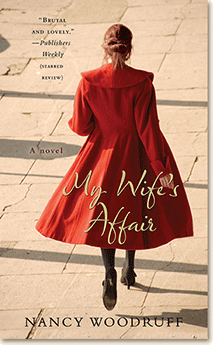 |

|
 |

We try, we husbands and fathers, we really do. I just want to tell
you that. We may not find the perfect
triceratops pajamas on
sale four months before the birthday; it wouldn't occur to us to set up
a magic closet
full of stickers and Silly Putty for them on days when
they're sick or scared or we just love them so much.
We don't always
remember to ask about swimming lessons or the spelling test, and
we've been known to
come home late at night and go straight to bed
without looking in on the kids (how this appalled Georgie.)
I admit all of this, but also say that when we walk in the door at
the end of the working day we don't ask for
peace
and quiet and the
day's mail, but instead—so grateful that they're ours—just for those
little bodies
coming at us in a rush.
Not that Georgie was any angel of the house. If you passed her on
the street, her orange scarf the only bit
of color against a full black
ensemble and all that wavy brown hair, you wouldn't necessarily picture
her
wrapping the dinosaur pajamas in dinosaur paper. But she
did, just the way she knew when to give them
Curious George and
when they would love Charlotte's Web, while all I could feebly remember
was that I had
read The Hobbit some time in junior high.
Because she had these passions, you see—that's how she knew
what to do. She threw herself into
motherhood the same way she had
thrown herself into acting. Or into me. It was the only way she could
possibly love what she loved, and she was spectacular at it—until she
tried to balance her passions. Georgie
knew, but would not quite
believe, that passions do not survive the weighing of one against
the other.
Georgie. I did call her Georgie-girl sometimes, though it wasn't
as corny as it might have been if we were
older and the song more
than a catchy tune our fathers used to hum.
Even now I can imagine her walking in and my saying, "Hey,
there, Georgie-girl," and the boys all over their
mother, and me, I
guess, like one of them.
I would do anything for her.
I would do anything for her.
Still.
I could begin, I suppose, when Georgie and I met. Manhattan: she
was an actor/waiter and I was a writer with a
boring day job near her
restaurant. Do I even need to say struggling? Or do I jump six years
later, when she
was four months pregnant with Fergus and we decided
to get married? Or to nineteen months after that, when
the
twins were born and Georgie was left an exhausted mother in a
fourth-floor walk-up, a Rapunzel with
three boys under two who
couldn't even leave the apartment by herself.
Perhaps the story begins in that house in New Jersey, the one we
fled to when it became impossible to stay
in the city any longer. It was
a fair trade, Georgie said, one kind of prison for another. She could
leave the
house now, but with no sidewalks to walk on, no parks or
coffee shops to stroll to, she could go nowhere
without wedging three
children into three car seats in the huge Volvo station wagon she was
terrified to drive.
For a time Georgie lost herself there, to a life she felt was someone
else's. She lost herself for almost four
years to a place that cut her off
from her version of the world. And then she found herself again, in
England,
and perhaps I should begin there—where the end began,
unless you are the type who believes it was there all
along, hovering,
waiting to swoop from the start.
England. The tithe barn. I have left a third of my life there, fully
half of my heart, and I can tell you honestly
now that I would have
abandoned everything to those walls if it weren't for those sons who
needed me, the
beautiful boys who went to England with two parents
who loved them and returned part of a family forever
in ruins.
|
 |